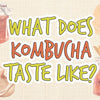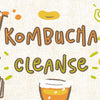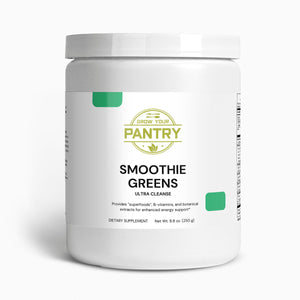Kombucha And Candida: Actionable Advice For Sufferers
In most cases, we would not recommend drinking kombucha if you have candida. Millions of people around the world suffer from the effects of candida. When you get an overgrowth of the candida yeast, many of the symptoms and effects can be evident while others are more silent. Those that suffer from candida are often confused if they can drink kombucha or not. This article will breakdown all of the questions and give you actionable advice, options, and help.
The information provided is in no way intended to be taken as medical advice. If you suspect that you have candida inform your physician and get medical advice. The information written is only intended to inform you regarding opinions collated and cited on the topic of candida and kombucha.
Not Much Time? Skip To What You'd Like To Learn...
-
What Are Kombucha And Candida?
-
5 Symptoms Of Candida
-
How Kombucha Effects Candida
-
Commercial Kombucha Brands And Candida
-
Fermented Food And Candida
-
The Healing Crisis
-
10 Natural Remedies For Candida
-
Common Questions
What Are Kombucha And Candida?

Kombucha is a fermented tea that originated in China over 2000 years ago. You make Kombucha tea by steeping tea leaves in hot water, mixing with sugar and then fermenting with a SCOBY for 10-14 days. This process creates fermented tea that can be enjoyed with or without added flavors.
“Candidiasis is a fungal infection due to any Candida (a type of yeast)” - source: Wikipedia. In simple terms, when a specific type of yeast grows, it causes an imbalance in your gut, causing symptoms to develop, this will lead to the diagnosis of candida. Although everyone has candida yeast living in the gut, this becomes an issue when there is an overgrowth. Many things can affect the symptoms of candida and make it worse.
5 Symptoms Of Candida
There's are an endless list of symptoms that candida sufferers may have, so we broke it down to 5 of the most common.
1. Chronic Fatigue. “Chronic fatigue syndrome (CFS) is a disorder characterized by extreme fatigue or tiredness that doesn’t go away with rest and can’t be explained by an underlying medical condition.” Source: HealthLine. Chronic fatigue can often be a symptom of candida, this is thought to be due to a weakened immune system.
2. White Tounge. Although many different fungal infections can cause a white tongue, it’s the symptom most often associated with candida. Another name for a white tongue is Oral Thrush. The white patches are visible to see, and you may be able to taste them too.
3. Itchy Vagina. Vaginal yeast infections can cause symptoms such as vaginal itching, irritation, and discharge. This symptom of candida is very prevalent; it’s reported that 75% of women experience a vaginal yeast infection in their life.
4. Itchy Skin. When there is an overgrowth of candida in the body, a symptom may be itchy skin. The growth is likely to be found in warm and moist areas on your body. This can be a harder symptom to attribute to candida as many conditions can cause this: herpes, eczema, and hepatitis - to name a few.
5. Finger Nails. Discoloration of your nails and feeling more brittle or weak can be a symptom of candida - often they'll appear yellow.
How Kombucha Effects Candida

Like everything with kombucha the answers are mixed. There are a lot of differing opinions and lots of conflicting anecdotal evidence.
Benefit Claims
Probiotics Reduce Candida Growth. There was a study where participants who were taking antibiotics were fed probiotics, and the results showed that by consuming the probiotics their candida colonization reduced.
Although the study does show probiotics reducing candida growth, the study doesn’t show that the individuals drank kombucha, instead, the probiotics contained some of the same bacteria that kombucha may contain. The second point to be aware of is that most commercially brewed kombucha has been pasteurized killing a lot of the probiotic benefits.
Negative Claims
-
Sugar. Yeast is a fungus that feeds on sugars to live and grow. Once somebody is aware that they have candida, they’ll often eliminate sugar from their diet, to control the overgrowth of candida. Kombucha, when brewed, contains a lot of sugar, however, in the process of fermenting the SCOBY feeds on the sugar. This removes some of the sugar from the final product. However, it doesn’t remove all of the sugar. An 8oz bottle contains 6-8 grams of sugar. As candida sufferers often remove sugar from their diet, by drinking kombucha you could be feeding the growth.
-
Yeast Strains. A SCOBY contains dozens of strains of yeast and bacteria. When purchasing or brewing your own SCOBY, you can’t be sure which stains are present. As some strains could be beneficial to your candida, equally others may not be good for it. Therefore when consuming you could potentially be drinking a lot of candida bacteria which may further the candida overgrowth - doing more harm than good.
Commercial Kombucha Brands And Candida
When kombucha is commercially produced, it often goes through multiple processes to make it comply with regulations and also to increase profit margins. For example, pasteurization, alcohol reduction, adding of bubbles, being fortified with probiotics, to name a few.
Therefore it’s unlikely to contain the same balance and strains of bacteria and yeast found in wild ferments. For this reason, it’s unlikely that commercially produced kombucha will help with candida.
There is little regulation around what can be defined as “kombucha” or not. Nothing specifically states how long it has to be fermented for, whether or not it can be pasteurized, if it can be carbonated after production, or even run through a microfilter to stop any strands remaining.
As kombucha has become more and more popular, it came under intense scrutiny by the FDA for containing alcohol without it stating so on the label. After this event and the push towards larger brands commercially producing kombucha there has been a trend towards a different kind of kombucha being sold. One that has been modified, played with and distancing themselves from the original wild ferment. Many have argued this new type of commercial kombucha lacks the health benefits of traditional fermented tea.
Fermented Food And Candida

Similar to kombucha a lot of controversy and debate remains around whether fermented foods are good or bad for people suffering from candida overgrowth.
Are fermented foods good for candida?
Here’s what AmyMyersMD has to say about fermented foods: “... I believe that anyone with Candida overgrowth should Avoid fermented foods until their yeast population is under control...The prebiotics produced during the fermentation process feed also feeds bad bacteria and yeast. Fermented foods themselves may be high in bad bacteria and yeast! I recommend killing candida first and then using fermented foods to help restore the good bacteria.”
From this we can see that similar advice for kombucha and other ferments is the same: it may cause new candida growth, so it’s best to change to a candida reduction diet first before experimenting and reintroducing fermented foods to your diet.
The Healing Crisis
Otherwise know as a Herxheimer Reaction. This is when the body reacts negatively to a drink or food when the body is detoxifying.
As some claim kombucha can be drank when you have candida and others say you should strictly avoid it, it can be very confusing.
When kombucha has been consumed, claims state that it can cause toxins to be released which travel around your body before being excreted.
Therefore if you have candida and consume wild fermented kombucha, and your symptoms get worse it could be down to two reasons.
Reason 1: Kombucha is bad for people with candida overgrowth and is now making your symptoms worse by promoting the growth of candida.
Reason 2: Kombucha is expelling the candida yeast overgrowth. When it is expelling the toxins that are related to the Candia are being released, causing you to feel worse and even cause your symptoms to become worse. Claims are that if you carry on drinking kombucha, your symptoms will gradually reduce once your bacteria becomes balanced.
To conclude the healing crisis, both reasons may be correct, but if you’re not feeling good, you should always consult with your doctor.
10 Natural Remedies For Candida

Many people are skeptical about using pharmaceuticals to treat candida. For the reason reports have shown antibiotics to kill all bacteria and not just candida, and other harmful bacteria. As candida is a bacterial overgrowth, their theory goes that you need only to use or consume specific remedies that bring down the candida levels to a natural balance that your body can then maintain.
The list of natural home remedies could be used in a few different ways, depending on the effected area and type of remedy. Digesting orally, in pill form, raw, or mixed into a drink. The other common way to use is by rubbing the remedy on the affected area. Make sure you’re not allergic to the remedy before trying.
1. Tea Tree Oil
2. Vitamin C
3. Probiotic Yogurt
4. Salt Water
5. Coconut Oil
6. Garlic
7. Oil Of Oregano
8. Grape Fruit Seed Extract
9. Apple Cider Vinegar
10. Lemon
Common Questions
Does Kombucha Kill Candida?
No. There isn’t any proof that kombucha kills candida. It’s thought certain strains of bacteria contained with kombucha could reduce the growth, but the drink hasn’t been proven to kill candida.
Does Kombucha Make Yeast Infections Worse?
Potentially. Eating or drinking anything with sugar has the potential to increase the fungus that causes yeast infections. Fermented tea contains a lot of different strains of bacteria so it could make it worse, yes.
Is Kombucha A Yeast?
No, but it contains yeast. Kombucha is a fermented tea beverage. To brew kombucha, you must use a SCOBY which contains yeast. Therefore kombucha brewed by traditional methods contains yeast.
What Foods Kill Candida?
There’s never been one type of food to have claimed to kill candida although a diet high in nutritious foods and low in sugar has been thought to help control and inhibit the growth of candida.
Does Kombucha Make You Poop?
It depends. Some factors include uour stomach’s capacity to handle fermented foods, the type of kombucha you have drunk and how much of it you drank. Just like everything we consume, it has the potential to make you poop.







